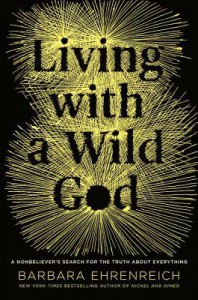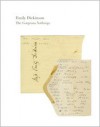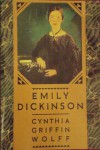Currently reading
Saints in Art
The Gorgeous Nothings: Emily Dickinson's Envelope Poems
Selected Poems
Emily Dickinson
Lies My Teacher Told Me : Everything Your American History Textbook Got Wrong
Gone with the Wind
Living with a Wild God: A Nonbeliever's Search for the Truth about Everything
 The short version: This book started out good. Then it got boring. Then it got irritatingly tedious. Then it got offensively bad.
The short version: This book started out good. Then it got boring. Then it got irritatingly tedious. Then it got offensively bad. True fact: It's impossible to read while simultaneously rolling one's eyes, smacking the book in question on the nearest hard surface, and yelling, "Oh, come ON!" I was doing all of those things on a regular basis by the time I hit the halfway mark. That's why this book took me so long to finish, and why I'm going to have to pay a library fine on a book I hate. Which only makes me hate it more.
Specifics: Barbara Ehrenreich was an intelligent, sensitive child. She was raised by dogmatic atheists who taught her to despise dogmatic religious beliefs. Her parents were also extremely unhappy – one of them eventually committed suicide.
Everybody who thinks this is a recipe for growing up to have the kind of midlife crisis that leaves you deeply religious, please raise your hand.
(In case you can't see from where you're sitting: Everyone in the entire world just raised their hands.)
Ehrenreich spends an entire book refusing to make this kind of obvious connection. The adolescent experience this book is supposed to be about is so poorly described that it's hard to sum up here, but basically: she took a trip to the desert. She arrived there after having had very little sleep and very little to eat. She'd also spent her entire adolescence on a ferocious quest to define the meaning of life.
(Ehrenreich seems to think this was an unusual thing for a teenager to do. Ehrenreich has apparently never bothered paying attention to any actual teenagers other than herself.)
When she gets to the desert, exhausted and hungry, she has a startling experience that I'm sure would have resonated profoundly with me if Ehrenreich had bothered to tell me what the heck actually happened. Here's the closest she comes to explaining:
At some point in my predawn walk – not at the top of a hill or the exact moment of sunrise, but in its own good time – the world flamed into life. How else to describe it? There were no visions, no prophetic voices or visits by totemic animals, just this blazing everywhere. Something poured into me and I poured out into it. This was not the passive beatific merger with "the All," as promised by the Eastern mystics. It was a furious encounter with a living substance that was coming at me through all things at once, and one reason for the terrible wordlessness of the experience is that you cannot observe fire really closely without becoming part of it. Whether you start as a twig or a gorgeous tapestry, you will be recruited into the flame and made indistinguishable from the rest of the blaze.
She couldn't just be a sensitive, intelligent teenager made emotionally vulnerable by hunger, thirst, exhaustion, and a landscape entirely new to her. Those couldn't add up to a sudden terrifying sense of her own insignificance. That would be too simple. Too ordinary.
All her life, she's felt herself to be someone special – an atheist in a country of believers, a skeptic among people who value conformity. Now suddenly she is nothing but a pitiful creature who could die of want and be swallowed up, utterly unnoticed, in these terrifyingly stark surroundings.
That emotional moment couldn't be meaningful in and of itself – a humbling experience that would prompt anyone to consider her life from a new and different angle. No, of course not. Being shaken up in this way must mean – duh! – that there really is something out there, some "Other" that needs to be found and defined.
I'm not objecting to the idea that there may well be "something out there." I'm arguing with the premise that having a gut-wrenching emotional experience while wandering young, hungry, thirsty, and tired in the desert makes someone an expert on how the universe works.
That's how Ehrenreich presents herself: the ultimate expert on the ultimate question. She never says "might be" when she can say "must be." She never says "I think" when she can say "I know." She trash-talks science for not exploring religious and spiritual matters, which makes about as much sense as sneering at Stephen Hawking for not being a concert pianist.
The scientific method is not equipped to grapple with philosophical questions. Why is this a problem? It's simply a statement of fact. Science is good at what it does, and what it does is narrowly defined. My food processor isn't equipped to make my bed for me. It's still a good food processor, and my bed still needs making. Well, okay.
Wild God reminds me of my favorite book of the Bible – an apocalyptic, apocryphal work called The Second Book of Esdras. Esdras is visited by the angel Uriel, and is understandably curious. Specifically, he asks some pretty heavy questions about the nature of God, good, and evil.
Uriel listens patiently enough and then says, sure, he'd be happy to answer Esdras' questions. But – fair's fair – Esdras should answer some questions first, mmkay?
If Esdras can answer three questions about three ordinary earthly matters, Uriel will tell him everything he wants to know about how things work in the rest of the universe. Aw, what the heck – Esdras only has to solve one of the Earthly problems Uriel sets for him.
Esdras thinks this is fair:
I said, "Speak on, my lord."
And he said to me, "Go, weigh for me the weight of fire, or measure for me a measure of wind, or call back for me the day that is past."
I answered and said, "Who of those that have been born can do this, that you ask me concerning these things?"
And he said to me, "If I had asked you, 'How many dwellings are in the heart of the sea, or how many streams are at the source of the deep, or how many streams are above the firmament, or which are the exits of hell, or which are the entrances of paradise?' perhaps you would have said to me, 'I never went down into the deep, nor as yet into hell, neither did I ever ascend into heaven.' But now I have asked you only about fire and wind and the day, things through which you have passed and without which you cannot exist, and you have given me no answer about them!"
And he said to me, "You cannot understand the things with which you have grown up; how then can your mind comprehend the way of the Most High?"
I love this passage so much I want to marry it, but that's not the point. The point is: Somebody, please, read this to Barbara Ehrenreich. And then ask her how exactly she has the nerve to admit that neither she nor anyone else knows everything about the human brain – a thing without which we cannot exist – yet she thinks we should skip past figuring out everything in this world and go right to an Unknowable she insists must be out there.
Because, you know, there's no way she could just be feeling something. If she has a strong sense that there's some Other out there, it must be true. Human brains never give us weird signals. Our sensations and emotions are always totally reliable. Ask any paranoid schizophrenic.
Read this book if you enjoy arrogant self-importance with a side of angst-ridden teenage poetry. (Of course Ehrenreich quotes her youthful scribblings. And of course the poems and deep thoughts she shares are totally awesome, provided that means something completely different from what the dictionary says.)
 1
1








